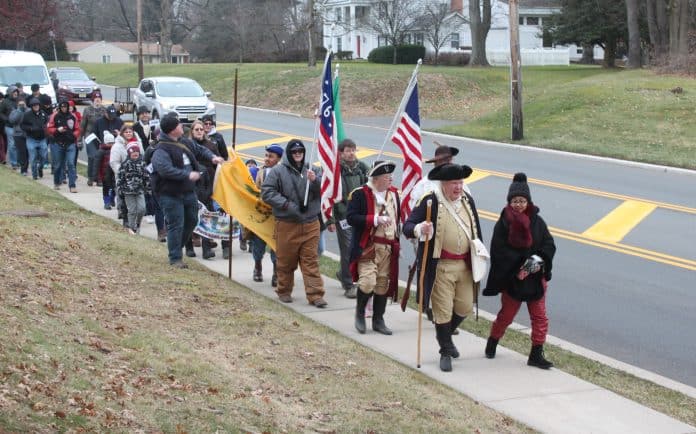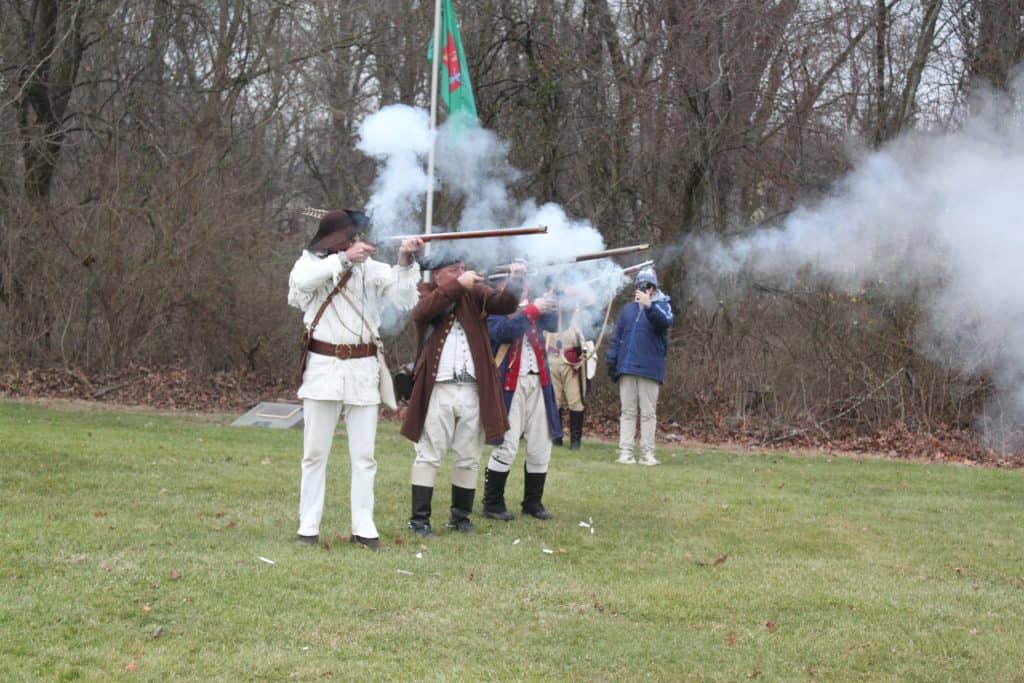
A hardy band of marchers commemorated the 62nd annual Colonel Edward Hand Historic March as they stepped off on a cloudy Saturday morning, 246 years and four days after Hand and his Pennsylvania riflemen delayed British and Hessian troops on their way to the Second Battle of Trenton on Jan. 2, 1777.
The annual march, which was held Jan. 6, began at the Lawrence Township Municipal Building and ended at the banks of the Shabakunk Creek on the Notre Dame High School campus.
The march is a reenactment of the American soldiers’ delaying tactics as they held off the British and Hessian troops from reaching Trenton, which was occupied by General George Washington’s Army. The troops were on their way to retake Trenton from the American rebels.
Keynote speaker Mark Sirak, a resource interpretive specialist at Washington Crossing State Park, outlined the chain of events that led to the First Battle of Trenton, the Second Battle of Trenton and the Battle of Princeton. They comprise the Ten Crucial Days campaign that turned the tide for the Americans.
The Revolutionary War began when the Declaration of Independence was signed on July 4, 1776, Sirak said. King George III sent 30,000 troops, including Hessian mercenary troops, to stop the rebellion. They landed on Staten Island, N.Y.
The series of events that led to the Second Battle of Trenton and Hand’s delaying tactics can be traced to the series of defeats suffered by Washington and his troops between August and November 1776. The American rebels retreated across New Jersey to Pennsylvania.
On Christmas Day 1776, Washington and 2,400 soldiers crossed the Delaware River from Pennsylvania and marched to Trenton. They routed the Hessian troops that were stationed there in the First Battle of Trenton. They crossed the Delaware River back to Pennsylvania.
Several days after the famous battle, Washington and his troops crossed the Delaware River again and stopped in Trenton. The British and Hessian troops were sent to Trenton to retake it from the Americans on Jan. 2, 1777.
Hand and the 1st Pennsylvania Rifle Regiment were dispatched to slow down the British and Hessian troops as they marched from Princeton to Trenton.
The Americans engaged the British and Hessian troops in several small skirmishes as they passed through Maidenhead, as Lawrence Township was originally known.
Despite the delaying tactics of Hand and his soldiers, the British and Hessian troops reached Trenton at dusk on Jan. 2, 1777. They engaged Washington and his soldiers in the Second Battle of Trenton.
The Americans retreated across the bridge over the Assunpink Creek. Their British and Hessian pursuers tried three times to cross the bridge, but they were turned back each time.
The British planned to continue the fight the next day. But during the night and into the morning of Jan. 3, 1777, Washington led his troops around the British and Hessian encampment, and followed a back road to Princeton.
On their way to Princeton, the Americans encountered British troops, Sirak said. They engaged the British troops and defeated them in the Battle of Princeton on Jan. 3, 1777.
“Those 10 days (between Dec. 25, 1776 and Jan. 3, 1777) really changed the world,” Sirak said, wrapping up his presentation.
Then the marchers, led by Lawrence Township resident William Agress, who portrays Col. Hand, and Mayor Patricia Hendricks Farmer, set out for the banks of the Shabakunk Creek. It was the site of one of the skirmishes between Hand’s soldiers and the British and Hessian troops. The marchers walked on the sidewalks on Route 206, known in 1777 as the King’s Highway.
At Notre Dame High School, a replica flag of Hand’s 1st Pennsylvania Rifle Regiment, bearing its motto of “Domari Nolo” – “I will not yield” – was hoisted on a flagpole near the creek by a couple of marchers.
A trio of historical reenactors fired off several volleys of blanks from their replica rifles, filling the air with smoke and wrapping up the annual reenactment march.

